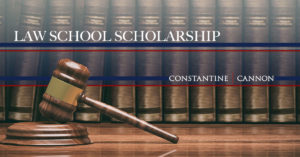Constantine Cannon Law School Scholarship

Essay Writing Contest – The Importance of Whistleblowers
Who Can Enter
Participants must be accepted to, or currently enrolled in an accredited US law school.
What You Can Win
- First Place: $2,500
- Second Place: $1,000
- Third Place: $750
- Fourth Place: $500
- Fifth Place: $250
Winning essays will also be featured on our Whistleblower Insider blog visited by more than 10,000 readers a month.
Application Deadline
You must submit your essay no later than January 10, 2020
When Will the Winners be Selected?
Your essays will be reviewed by members of the Constantine Cannon whistleblower lawyer team and winners will be announced by February 15, 2020.
Who We Are
Constantine Cannon is a law firm with offices located in New York, Washington, DC, San Francisco and London, specializing in antitrust law, whistleblower law, complex commercial litigation, art and cultural property, compliance monitoring and investigation, and e-discovery counseling. Our whistleblower practice is one of the largest in the country and Europe, primarily focused on representing whistleblowers under the False Claims Act, the Whistleblower Programs of the SEC, CFTC and IRS, and the numerous other federal and state whistleblower programs.
The Importance of Whistleblowers
This is a gilded age for whistleblowers. Relatively speaking that is. It was not all that long ago that whistleblowers were treated as mere opportunists ratting out their friends or colleagues. Squealing not for the greater good, but for a quick buck, or to cover up their own failings or misdeeds. Many still see it that way. After all, we are trained at an early age that nobody likes a snitch.
But a new mindset has emerged — where getting involved is actually the right thing to do; where if you see something, you are supposed to say something. And with this new outlook has come some additional prodding from a host of newly energized whistleblower protection and rewards laws that sweeten the pot considerably for these newfound heroes. And we seem to read about them all the time. This one who reported on the pharmaceutical giant selling defective or mislabeled drugs. That one who reported on the medical clinic billing for services it never performed. Or the one who reported on the multibillion-dollar tax evasion scheme. The list goes on and on, touching upon virtually every industry in the country.
But while improving considerably, the picture is not all wine and roses for whistleblowers. Retaliation is as virulent as ever. And it is not just a cold shoulder from colleagues or superiors, or simply being excluded from work decisions or assignments. It even goes beyond demotions, pay cuts, and firings. The retaliation sometimes goes so far as to include harassment and, in some cases, even physical violence. And it is not just happening within corporate America. It is just as rampant within the hallowed halls of some of our most respected government agencies.
Even mainstream America continues to maintain a sense of ambivalence, for some even downright hostility, towards whistleblowers. Look at how they are commonly depicted in our everyday lexicon by Thesaurus.com and Merriam-Webster, the two leading resources for everything word-related. Of the 30 synonyms these publications use to describe whistleblowers to their 90 million monthly visitors, the vast majority of them are deeply derogatory and paint the whistleblower as dishonest, disloyal and driven by unsavory motives — Betrayer, Bigmouth, Fink, Rat, Snitch, Squealer, Tattletale and Troublemaker to name just a few.
Is it any wonder that despite the progress we have made in recognizing the importance of whistleblowers, a negative perception of whistleblowers persists? That is where you come in. As the future guardians of justice in this country, we want to hear from you on the important role whistleblowers play, and what more we can do to encourage and protect them.
Essay Requirements
We would like students to write an essay between 250 and 750 words that addresses one of more of the following questions:
- What does it mean to be a whistleblower?
- Tell us about a personal whistleblower experience.
- Tell us about a whistleblower who has inspired you.
- How important are whistleblowers to promoting transparency in government and protecting the health and safety of the public?
- What is the best way to encourage whistleblowers to say something when they see something?
Tagged in: Scholarship,
Hi Alex,
Thank you for your interest in our scholarship contest. Besides the word limit, we do not have any specific requirements on how formal the essay should be. We would encourage you to address the essay prompt in whatever manner you feel is the most persuasive.
-The Whistleblower Insider Team.
To whom this may concern,
Is the essay meant to be a formal legal essay or is it meant to be an article?
Another thing, how formal does it have to be? Are we allowed to use first-person?
Thank you.
Best Regards,
Alex.